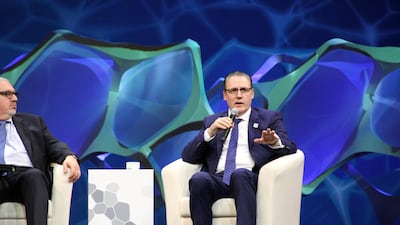To rebuild the parts of Syria, Iraq, Libya and other Arab countries that have been devastated by conflict requires an estimated 50 million tonnes of cement a year.
This, in turn, requires more than two billion cubic metres of water, according to Abdullah Al Dardari, a World Bank official.
In a part of the world that suffers severe water stress, there is simply not enough spare to use in reconstruction efforts, which could cost as much as $1 trillion.
It is dilemmas such as this that illustrate to Mr Al Dardari the need to harness the benefits of technology in Middle Eastern societies as they emerge from conflict.
“New construction technology is necessary if we want to see people going back to their homes and living productive lives,” said Mr Al Dardari at the World Science Forum in Jordan.
Speaking at the Dead Sea event during a session titled "Rebuilding broken societies through reconstruction and recovery", Mr Al Dardari, a former Syrian deputy prime minister who now advises the World Bank's vice president for the Middle East and North Africa on reconstruction, highlighted many other fields where science and technology could prove vital.
_______________
Read more:
Syria war has cost $226 billion to its economy: World Bank
Science key to solving regional and global threats, forum hears
_______________
Among them is education, because Mr Al Dardari said, it would not be possible to rebuild the 7,000 damaged or destroyed schools in Syria, destruction that has left as many as 2 million children in the country without education, and more than half a million Syrian refugee children without schooling.
New technology could take the place of bricks and mortar.
“We have to think of maybe a completely mobile and digitised system,” he said.
It should be part of a broader effort in the region to have a “dramatic and different approach to rebuilding”.
“Reconstructing in the old style of rebuilding physical assets will not work. Take Syria, for example. Ninety per cent of the total damage to the Syrian economy is because of the collapse of economic organisations and social networks, not because of the physical damage,” said Mr Al Dardari.
“Trying to rebuild physical structures without taking account of social networks and a new social contract won't work.”
Using the same technology will not allow for economic recovery at a rate sufficient to provide employment for Arab youth, he said.
“Orthodox economics won't work post-conflict. We're talking about heterodox economics. The region needs a paradigm shift in government, in economic theory, economic institutions and in the technological component of Arab economies,” he said.
As well as introducing new technology into societies, he said it was essential for the Arab world to become more active in knowledge generation. This would benefit from improved regional integration, as this would better facilitate investments on the scale needed.
Improved regional co-operation was highlighted as critical by Mihail Dimovski, executive director of the Regional Environment Centre in Hungary. A Macedonian, he grappled with such issues when he was involved in helping the fractured societies of the former Yugoslavia recover.
“When I see conflicts [today], it's deja vu,” he said.
One strategy he favours is to encourage groups hostile to one another to focus on shared problems, from environmental destruction to air pollution and water resources.
“Having climate change [or] energy as a community platform, I believe the countries can sit at the same table,” he said.
“The conflict today has a great opportunity to learn from these examples. Moving [on] from the reasons for the conflict to another topic is important; the common vision is to have stability and economic growth.”


